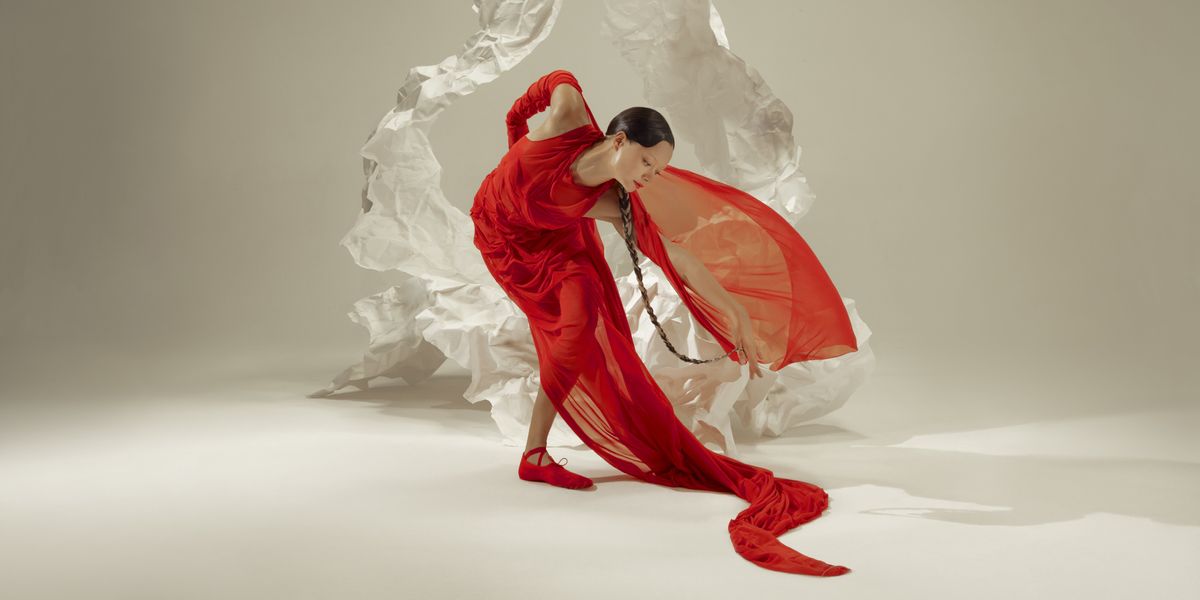
Who do I run from? Who do I run towards?
YIAN begins with departure. A curvature in time subtle enough to invite imbalance and open enough to feel like embrace, the first question of Lucinda Chua’s debut album does not ask where or when of its listener, but instead: “Who?”
“I like the idea of the album being a loop that starts with a question and ends with a question," Chua tells PAPER by way of introduction. "I think going into the album, I was looking for answers, looking for something very tangible and concrete that would give me a sense of having conquered it. But the deeper I went into the album, the more I realized I don’t know anything.”
If Chua’s central question is who, YIAN is her response. An intuitive player, Chua took up piano by ear at age three. Learning by listening, rather than reading sheet music, Chua’s musical practice is personal and corporeal.
“Music is something that I felt so much in my body from a young age,” Chua explains.
She departed from the classical world to session work and rock music in her early teens, eventually going on to support acts like FKA Twigs during her Magdalene tour. Chua’s own discography has been steadily expanding from symphonic and solo cello compositions to her first EPs Antidotes 1 & 2. Where Antidotes distills emotional vignettes — like snowflakes caught on a finger and melting into memory —YIAN descends in all directions around its listeners, a flurry in time.
On YIAN, Chua constructs landscapes of herself: an ocean, an avalanche, the echo of the wind under-wing. Named for Chua’s middle name in Mandarin, YIAN translates to "swallow," a songbird whose reliable migration — its own paradox —connotes positive change, the dawn of spring.
“I never fully understood it. It always felt quite alien to me,” Chua says of her Mandarin name, Siew Yian. “It translates to 'swallow,' which is a songbird that migrates between two places, and I really resonated with that as a symbol or metaphor, because I’ve felt very in between the Eastern world and the Western world growing up with two cultures in my family. I guess the feeling of the in-between is something that I’ve always felt. I explore that in the record.”

With influences in ambient and classical music, Chua’s dioramic memory conjures pastorals alongside impressionism, as if Harold Budd’s “Sea, Swallow Me” undertowed Vaughn Williams’ “The Lark Ascending.” The motion of Chua’s swallow is two-fold, soaring beyond itself and surrendering, swallowed, to a whole.
Chua reclaims the narrative of exploration. We encounter Chua at the center of a mutable landscape: her own diasporic identity, having been born to a Chinese-Malaysian father and a white British mother. Putting sound to her internal dissonance, YIAN exercises curiosity in contradiction. “I really like the fine line between something that's really pleasurable and really uncomfortable in the music, the dissonance and then the resolution. I think as a listener it can feel really gratifying to be on your toes but then to have that moment of release.”
For listeners, YIAN is a permeable space stripped to essentials — reverberated keys, mantric melodies and no drums —YIAN is unmoored by temporality. The place is the person from which time flows.
“There’s so much empathy within the listener that it can awaken certain things” Chua says of her own relationship to music. “It’s like I’m watching or listening to someone else feel those emotions, and it’s reminding me of my capacity to feel.”
YIAN is contemplative and hopeful. Journeying towards an inaccessible home, Chua glides across the emotional currents of a crystalline landscape. Distorted strings gain glitchy permanence on “Grief Piece;” strings played sul ponticello on "Autumn Leaves Don’t Come" oscillates across its own borderland as Chua’s lyrics linger more as thoughts than melodies. “I’ve been living in the sky too long/ Waiting for someone to take me home,” Chua harks, a swallow.

Arriving just after the spring equinox, YIAN is in perpetual transformation: Paper roses bloom across ancestral stones in “Echo,” and Chua’s outstretched orchid palm, lan hua zhang, decorates YIAN’s music videos.
“We say 'like an English rose' to specify a certain type of beauty,” Chua explains. “But it’s interesting that the rose is indigenous to Asia. The rose originated in China and was brought over to the UK. I love the idea of the rose being a symbol of the diaspora.”
Pulling visual cues from Chua’s exploration of classical Chinese dance, YIAN is informed by fragmentation and reformation. Lost under the Song Dynasty, much of the cultural practice of Chinese classical dance has been carried through memory. Through careful study of ancient Chinese cave paintings, scriptures and texts incorporated into martial arts and Russian ballet, Chinese classical dance was reborn, much like the album, which Chua describes as “a returning or remembering.”

Just as there is a sense of recollection throughout YIAN, there is a counter-parallel tide of loss. “There is a feeling of falling,” I note, “between the rose petals, the snow, “Autumn Leaves Don’t Come,” without really a clear direction or arrival.”
“It’s quite elemental. There’s an emotional weather,” Chua adds. “Snow at first can feel magical, but it can be tiring, you know, because it’s like you’re carving out your path or you’re finding your way and leaving these marks behind.”
In every revolution toward a whole, Chua diverges. Chords dissolve and swell in the final moments of YIAN''s closing song “Something Other Than Years,” and resolve in a second question: “When all I feel/ Is all I know/ Show me how to live this life/ Something other than years."
Sung in rounds alongside the album’s only feature (by yeule, a fellow child of the diaspora) Chua’s curiosity turns this time to the listener, prompting a response and inviting departure anew.
Photos by Milo Van Giap
From Your Site Articles
Related Articles Around the Web